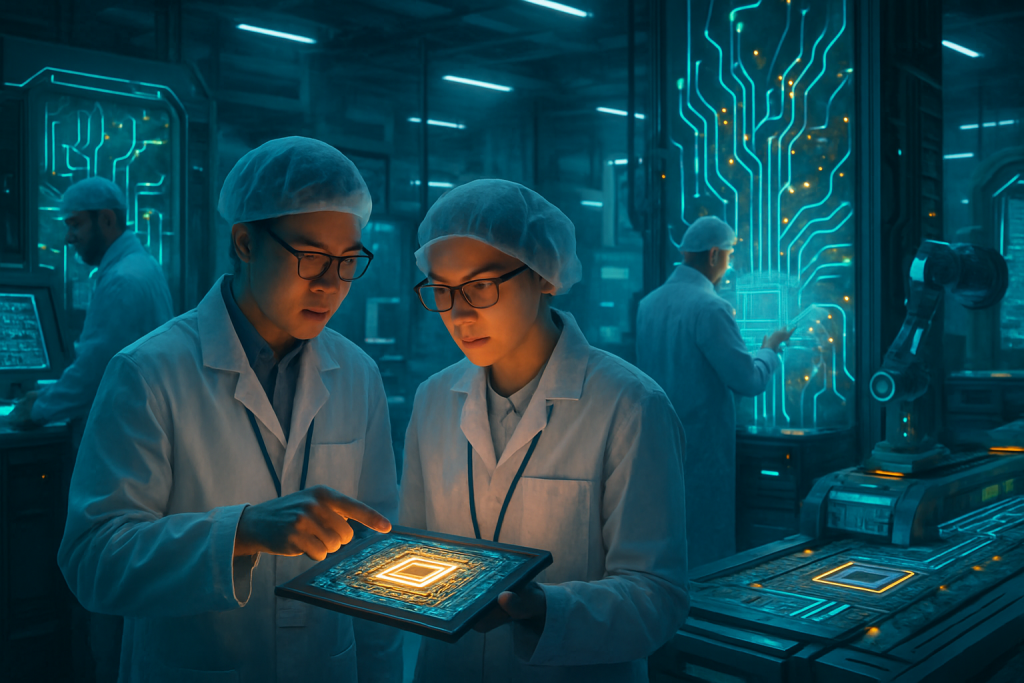October 13, 2025: A date that might just be remembered as the moment OpenAI truly started building its own digital destiny. Forget renting server space; they’re going for the gold, announcing a groundbreaking partnership with Broadcom to design and manufacture custom AI chips. It’s a move that echoes the ambition of Tony Stark building his arc reactor in a cave- except this time, the cave is a state-of-the-art semiconductor fab.
But why is this such a big deal? Let’s rewind a bit. For years, AI development has largely relied on general-purpose hardware, mostly GPUs. Think of it like this: you’re trying to win the Indy 500 with a really souped-up minivan. Sure, it’s got power, but it’s not exactly optimized for the track. As AI models like GPT-7 and beyond have ballooned in size and complexity- demanding ever more processing power- the limitations of this approach have become glaring.
Training these colossal neural networks is like trying to boil the ocean with a microwave. The energy consumption is astronomical, the processing times are excruciating, and the costs? Don’t even ask. OpenAI, like other AI pioneers, has been feeling the squeeze. They’ve been pushing existing hardware to its absolute limits, and now they’re saying “enough is enough”. It’s time to forge their own path.
Enter Broadcom, a semiconductor powerhouse known for its expertise in designing and manufacturing complex chips. They’re the guys who know how to turn silicon into magic. By teaming up with Broadcom, OpenAI isn’t just ordering off the menu; they’re getting the chef to create a custom dish, perfectly tailored to their specific appetite for AI processing power. This isn’t just about more speed; it’s about efficiency, control, and strategic advantage.
So, what does this partnership actually entail? Imagine a conversation between AI researchers and chip designers, a meeting of minds where the needs of the algorithms dictate the architecture of the hardware. OpenAI will provide the specifications, the unique demands of their AI workloads, and Broadcom will translate that into silicon. The result will be AI processors fine-tuned to accelerate OpenAI’s algorithms, slashing processing times and reducing energy consumption. Think of it as giving their AI models a custom-built rocket ship instead of a minivan.
The implications for the AI industry are profound. This isn’t just about OpenAI getting a performance boost; it’s about setting a new standard. It’s a signal to the entire industry that custom hardware is no longer a luxury, but a necessity for those pushing the boundaries of AI. Expect other major players- Google, Meta, maybe even Tesla- to follow suit, either by partnering with existing chipmakers or by developing their own in-house silicon capabilities. The AI hardware race is officially on.
Beyond performance, there’s the question of cost. Relying on third-party hardware can be expensive, and it puts AI companies at the mercy of market forces and supply chain disruptions. By developing their own chips, OpenAI can potentially reduce their hardware costs and gain greater control over their supply chain. In a world where every millisecond of processing time costs money, this could translate into significant savings.
But perhaps the most important implication is the strategic one. In the age of AI, hardware is no longer just a commodity; it’s a strategic asset. By controlling their own hardware, OpenAI can differentiate themselves from the competition and maintain a technological edge. They can also tailor their chips to specific AI applications, creating specialized hardware for everything from natural language processing to computer vision. It’s about building a vertically integrated AI ecosystem, from the algorithms to the silicon.
Of course, this partnership also raises some interesting questions. Will this move create a two-tiered system in the AI world, where those with access to custom hardware have a significant advantage over those who don’t? Will it lead to a concentration of power in the hands of a few large companies? And what about the ethical implications of creating ever more powerful AI systems? As Uncle Ben said, with great power comes great responsibility, and OpenAI’s partnership with Broadcom is a huge step in that direction.
From a financial perspective, this is a win for both companies. OpenAI gets access to cutting-edge hardware, and Broadcom gets a major new customer and a chance to solidify its position as a leading supplier of AI chips. The broader impact on the semiconductor industry remains to be seen, but it’s likely to spur innovation and competition. Investors are already buzzing about the potential for new chip architectures and specialized AI hardware. As the Reuters article points out, Wall Street reacted very positively, with Broadcom’s stock surging on the news.
In conclusion, OpenAI’s partnership with Broadcom is more than just a business deal; it’s a turning point in the AI revolution. It’s a recognition that hardware is just as important as software, and that the future of AI lies in the synergy between the two. As we move forward, it will be fascinating to watch how this collaboration unfolds and what impact it has on the AI landscape. One thing is certain: the AI race is heating up, and the stakes have never been higher.
Discover more from Just Buzz
Subscribe to get the latest posts sent to your email.


